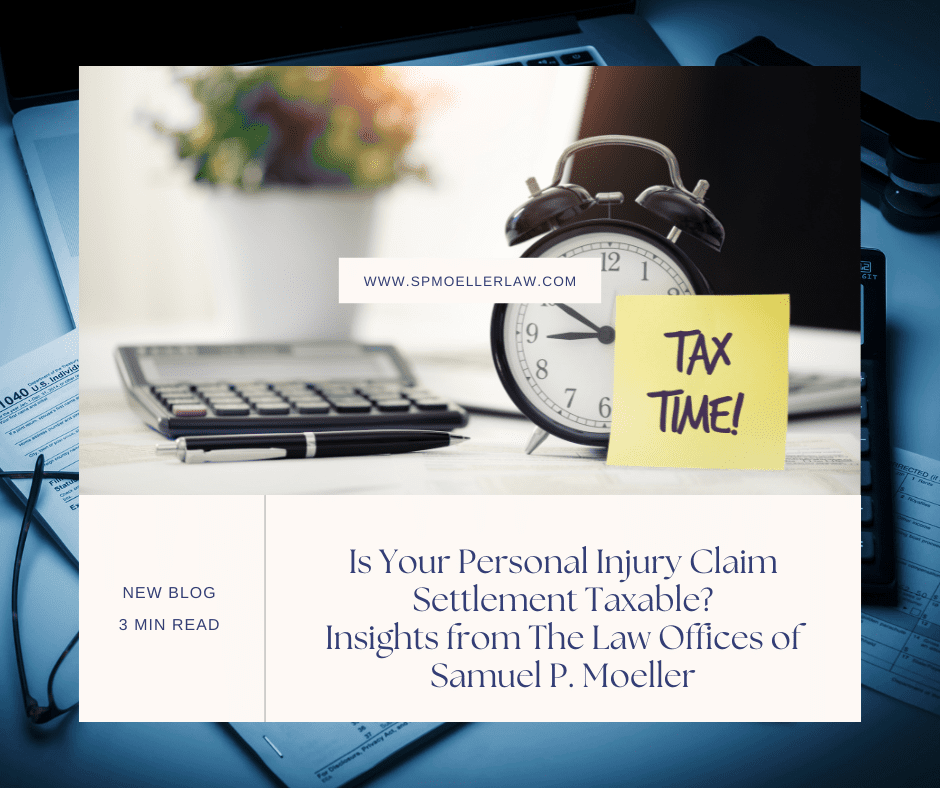Insights from The Law Offices of Samuel P. Moeller
Have you just settled a personal injury claim and are now wondering about taxes on the settlement? The answer isn’t straightforward. However, with guidance from The Law Offices of Samuel P. Moeller, you can confidently understand the tax implications of your personal injury settlement.
Understanding Personal Injury Settlements
Personal injury settlements compensate individuals who have been hurt by someone else’s carelessness or harmful actions. These settlements cover medical expenses, lost wages, long-term disabilities, or disfigurements, as well as non-economic damages like pain and suffering. The calculation of these settlements is complex, considering the severity of the injury, recovery prospects, and the overall impact on your life and future earnings. With such high stakes, having a skilled personal injury lawyer is crucial. They make sure all areas of compensation are considered, ensuring that the settlement you receive is fair and comprehensive.
The General Tax Rule for Personal Injury Settlements
Generally, the IRS does not tax most personal injury settlements, meaning the compensation meant to return you to your pre-injury condition isn’t taxed. However, there are exceptions:
- Punitive Damages: These are taxed because they are meant to punish the defendant, not compensate you for a loss.
- Interest: If your settlement includes interest from the time the claim was filed to when it was settled, this interest is taxable.
- Past Tax Deductions: If you deducted medical expenses on your taxes and then got reimbursed for those same expenses in your settlement, you might need to declare that reimbursement as taxable income.
To handle these complexities, it’s wise to consult a tax professional who can provide advice tailored to your specific situation. This, combined with legal advice, can help optimize the financial outcome of your settlement.
The Importance of Proper Documentation and Legal Guidance
Keeping detailed records is vital. This includes all receipts, invoices, medical records, proof of lost income, and communications with insurers or other parties. Proper documentation supports your claim and is essential for addressing any tax issues that might arise.
The expertise of an experienced personal injury lawyer is equally important. Attorneys like those at The Law Offices of Samuel P. Moeller can accurately evaluate your damages, negotiate with insurers, and ensure your settlement is structured in a tax-advantageous way. They can also guide you in managing the financial aspects of your compensation, helping you meet any tax obligations and facilitating a smoother recovery.
By maintaining thorough records and working with a knowledgeable lawyer, you can face any legal or tax challenges confidently, making sure your settlement supports your recovery and healing effectively.
In conclusion, understanding the tax implications of a personal injury settlement can be complex, but it’s an essential part of ensuring that you receive the full benefits you are entitled to without unwanted surprises. Armed with comprehensive documentation and guided by the seasoned expertise of a personal injury lawyer, you can navigate the intricacies of your settlement effectively. By doing so, you not only safeguard your financial future but also ensure that your recovery process is as smooth and unencumbered as possible. Remember, the right legal and financial advice is key to maximizing the positive impact of your settlement and helping you move forward after an injury.

[forminator_form id=”169″]